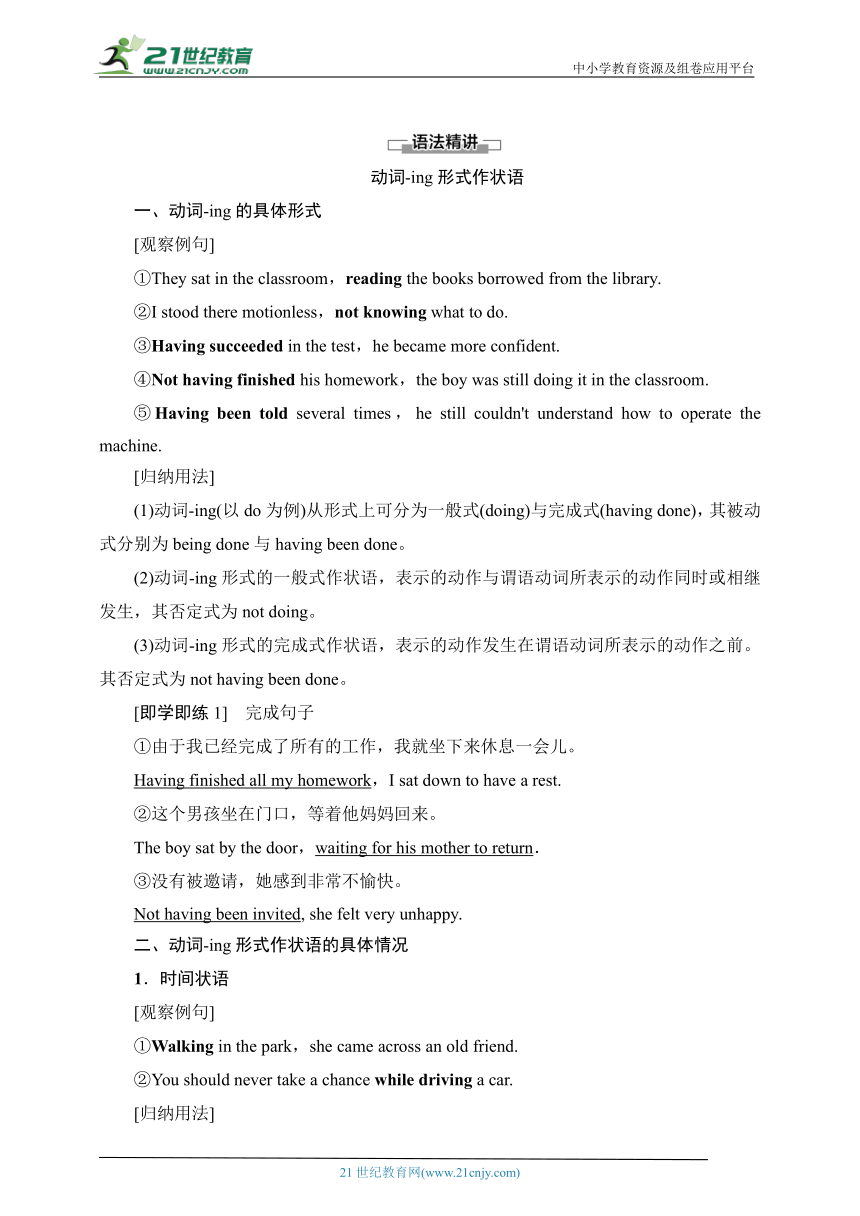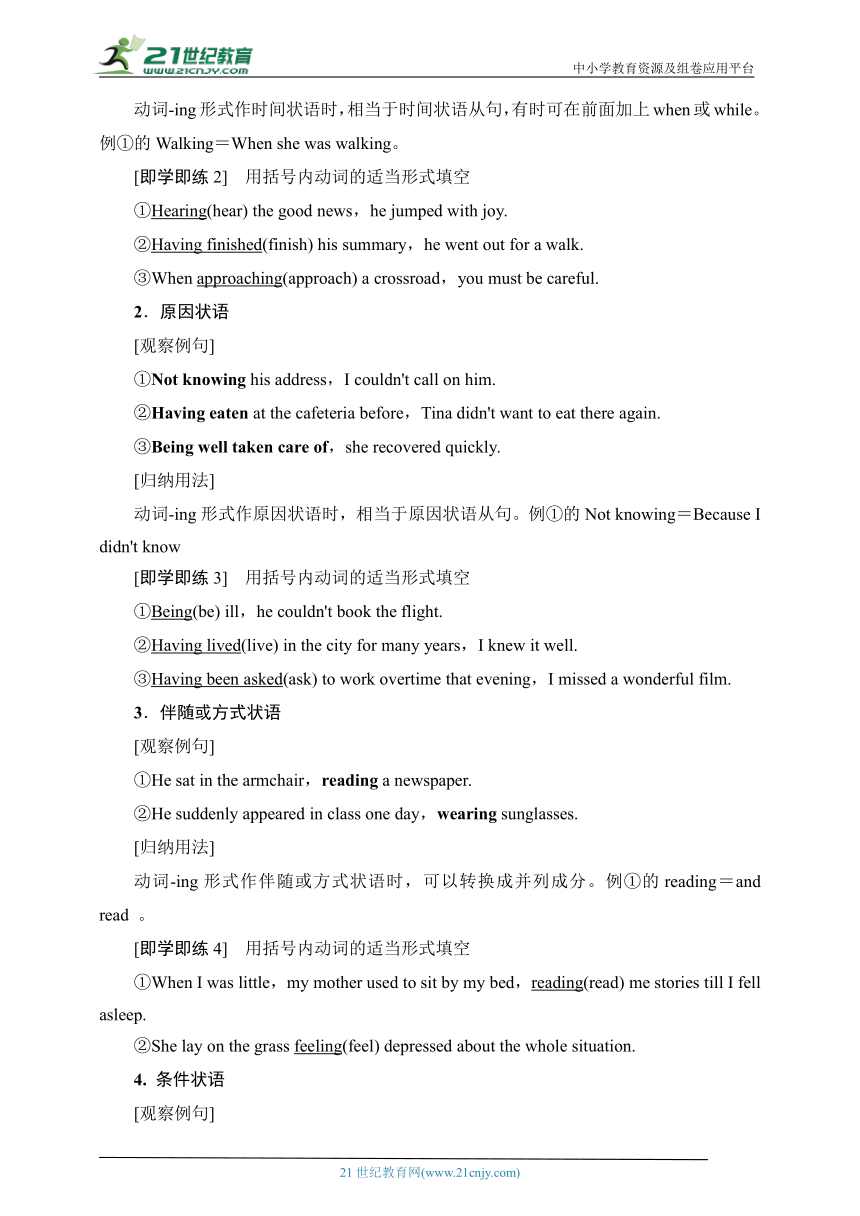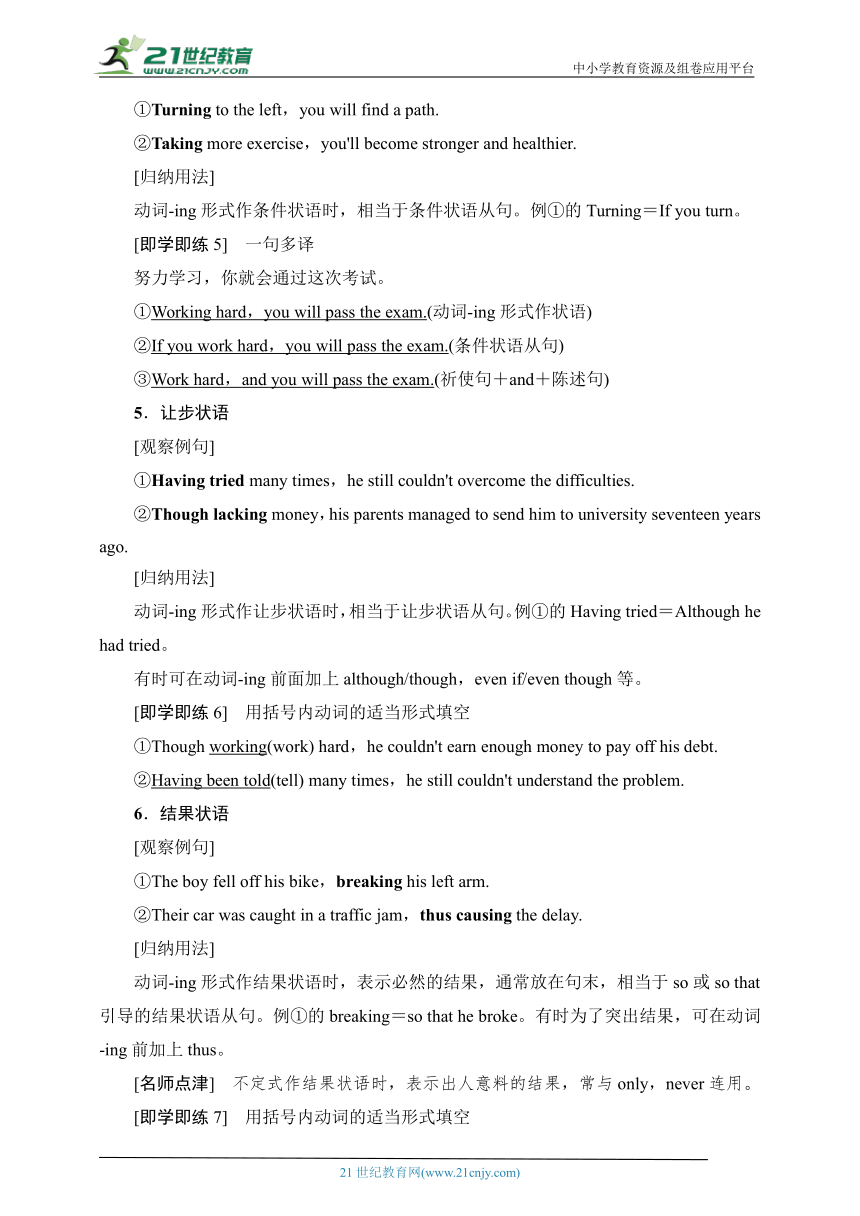Unit 4 Stage and screen学案part3
文档属性
| 名称 | Unit 4 Stage and screen学案part3 |  | |
| 格式 | doc | ||
| 文件大小 | 882.4KB | ||
| 资源类型 | 试卷 | ||
| 版本资源 | 外研版(2019) | ||
| 科目 | 英语 | ||
| 更新时间 | 2023-01-11 23:16:04 | ||
图片预览



文档简介
中小学教育资源及组卷应用平台
动词 ing形式作状语
一、动词 ing的具体形式
[观察例句]
①They sat in the classroom,reading the books borrowed from the library.
②I stood there motionless,not knowing what to do.
③Having succeeded in the test,he became more confident.
④Not having finished his homework,the boy was still doing it in the classroom.
⑤Having been told several times,he still couldn't understand how to operate the machine.
[归纳用法]
(1)动词 ing(以do为例)从形式上可分为一般式(doing)与完成式(having done),其被动式分别为being done与having been done。
(2)动词 ing形式的一般式作状语,表示的动作与谓语动词所表示的动作同时或相继发生,其否定式为not doing。
(3)动词 ing形式的完成式作状语,表示的动作发生在谓语动词所表示的动作之前。其否定式为not having been done。
[即学即练1] 完成句子
①由于我已经完成了所有的工作,我就坐下来休息一会儿。
Having finished all my homework,I sat down to have a rest.
②这个男孩坐在门口,等着他妈妈回来。
The boy sat by the door,waiting for his mother to return.
③没有被邀请,她感到非常不愉快。
Not having been invited, she felt very unhappy.
二、动词 ing形式作状语的具体情况
1.时间状语
[观察例句]
①Walking in the park,she came across an old friend.
②You should never take a chance while driving a car.
[归纳用法]
动词 ing形式作时间状语时,相当于时间状语从句,有时可在前面加上when或while。例①的Walking=When she was walking。
[即学即练2] 用括号内动词的适当形式填空
①Hearing(hear) the good news,he jumped with joy.
②Having finished(finish) his summary,he went out for a walk.
③When approaching(approach) a crossroad,you must be careful.
2.原因状语
[观察例句]
①Not knowing his address,I couldn't call on him.
②Having eaten at the cafeteria before,Tina didn't want to eat there again.
③Being well taken care of,she recovered quickly.
[归纳用法]
动词 ing形式作原因状语时,相当于原因状语从句。例①的Not knowing=Because I didn't know
[即学即练3] 用括号内动词的适当形式填空
①Being(be) ill,he couldn't book the flight.
②Having lived(live) in the city for many years,I knew it well.
③Having been asked(ask) to work overtime that evening,I missed a wonderful film.
3.伴随或方式状语
[观察例句]
①He sat in the armchair,reading a newspaper.
②He suddenly appeared in class one day,wearing sunglasses.
[归纳用法]
动词 ing形式作伴随或方式状语时,可以转换成并列成分。例①的reading=and read 。
[即学即练4] 用括号内动词的适当形式填空
①When I was little,my mother used to sit by my bed,reading(read) me stories till I fell asleep.
②She lay on the grass feeling(feel) depressed about the whole situation.
4. 条件状语
[观察例句]
①Turning to the left,you will find a path.
②Taking more exercise,you'll become stronger and healthier.
[归纳用法]
动词 ing形式作条件状语时,相当于条件状语从句。例①的Turning=If you turn。
[即学即练5] 一句多译
努力学习,你就会通过这次考试。
①Working hard,you will pass the exam.(动词 ing形式作状语)
②If you work hard,you will pass the exam.(条件状语从句)
③Work hard,and you will pass the exam.(祈使句+and+陈述句)
5.让步状语
[观察例句]
①Having tried many times,he still couldn't overcome the difficulties.
②Though lacking money,his parents managed to send him to university seventeen years ago.
[归纳用法]
动词 ing形式作让步状语时,相当于让步状语从句。例①的Having tried=Although he had tried。
有时可在动词 ing前面加上although/though,even if/even though等。
[即学即练6] 用括号内动词的适当形式填空
①Though working(work) hard,he couldn't earn enough money to pay off his debt.
②Having been told(tell) many times,he still couldn't understand the problem.
6.结果状语
[观察例句]
①The boy fell off his bike,breaking his left arm.
②Their car was caught in a traffic jam,thus causing the delay.
[归纳用法]
动词 ing形式作结果状语时,表示必然的结果,通常放在句末,相当于so或so that引导的结果状语从句。例①的breaking=so that he broke。有时为了突出结果,可在动词 ing前加上thus。
[名师点津] 不定式作结果状语时,表示出人意料的结果,常与only,never连用。
[即学即练7] 用括号内动词的适当形式填空
①He comes home late every evening,making(make) his wife very angry.
②Anxiously,she took the dress out of the package and tried it on,only to find(find) it didn't fit.
③The snow lasted a week,thus resulting(result) in a serious traffic jam in the whole area.
7.评注性状语
[观察例句]
①Generally speaking,children are naturally curious.
②Considering the budget,we have decided to give up the travel plan.
[归纳用法]
有些动词 ing形式用于句首,没有逻辑主语而独立存在,作为句子的独立成分来修饰全句,表明说话者的态度、观点等,这被称为评注性状语。常见的评注性状语有:generally speaking一般来说,frankly speaking坦率地说,roughly speaking大致说来,judging from/by...根据……来判断,considering...考虑到……,supposing...假如……等。
[即学即练8] 补全句子
①Frankly speaking(坦率地说),the resources in the world are very limited.
②Judging from his accent(从他的口音判断),he must be from the south.
Ⅰ.单句语法填空
1.When leaving(leave) the airport,they waved again and again to us.
2.Having worked(work) for a whole day,the secretary looked exhausted.
3.George returned after the war,only to be told(tell) that his wife had had a car accident.
4.Not knowing(know) her address,we can't get in touch with her.
5.Though lacking(lack) a little confidence,he finished the speech successfully.
6.Being talked(talk) to,you should look into the eyes of the person.
7.Having been shown(show) around the Water Cube,we were then taken to see the Bird's Nest.
8.Having written(write) an important letter,I listened to the music for a while.
9.Judging(judge) from his expression,he was frightened of spiders.
10.There is no greater pleasure than lying on my back in the middle of the grassland,staring(stare) at the night sky.
Ⅱ.用括号内动词的适当形式填空
Last weekend,I 1.walked(walk) into our local bookshop.2.Having bought(buy) a book,I decided 3.to take(take) the bus home,because it was quite a long walk home.
When 4.getting(get) on the bus,I was 5.surprised(surprise) to see an old friend of mine.We started 6.talking/to talk(talk) and I hardly realized that I had arrived at my stop.7.Standing(stand) up,I cried,“Please wait! This is my stop!” I got off the bus,8.smiling(smile) happily.Then,suddenly 9.realizing(realize) I had left my book behind on the bus,I shouted,“Stop,please!” But it was too late.The bus had gone away,10.taking(take) my book with it.
21世纪教育网 www.21cnjy.com 精品试卷·第 2 页 (共 2 页)
21世纪教育网(www.21cnjy.com)
动词 ing形式作状语
一、动词 ing的具体形式
[观察例句]
①They sat in the classroom,reading the books borrowed from the library.
②I stood there motionless,not knowing what to do.
③Having succeeded in the test,he became more confident.
④Not having finished his homework,the boy was still doing it in the classroom.
⑤Having been told several times,he still couldn't understand how to operate the machine.
[归纳用法]
(1)动词 ing(以do为例)从形式上可分为一般式(doing)与完成式(having done),其被动式分别为being done与having been done。
(2)动词 ing形式的一般式作状语,表示的动作与谓语动词所表示的动作同时或相继发生,其否定式为not doing。
(3)动词 ing形式的完成式作状语,表示的动作发生在谓语动词所表示的动作之前。其否定式为not having been done。
[即学即练1] 完成句子
①由于我已经完成了所有的工作,我就坐下来休息一会儿。
Having finished all my homework,I sat down to have a rest.
②这个男孩坐在门口,等着他妈妈回来。
The boy sat by the door,waiting for his mother to return.
③没有被邀请,她感到非常不愉快。
Not having been invited, she felt very unhappy.
二、动词 ing形式作状语的具体情况
1.时间状语
[观察例句]
①Walking in the park,she came across an old friend.
②You should never take a chance while driving a car.
[归纳用法]
动词 ing形式作时间状语时,相当于时间状语从句,有时可在前面加上when或while。例①的Walking=When she was walking。
[即学即练2] 用括号内动词的适当形式填空
①Hearing(hear) the good news,he jumped with joy.
②Having finished(finish) his summary,he went out for a walk.
③When approaching(approach) a crossroad,you must be careful.
2.原因状语
[观察例句]
①Not knowing his address,I couldn't call on him.
②Having eaten at the cafeteria before,Tina didn't want to eat there again.
③Being well taken care of,she recovered quickly.
[归纳用法]
动词 ing形式作原因状语时,相当于原因状语从句。例①的Not knowing=Because I didn't know
[即学即练3] 用括号内动词的适当形式填空
①Being(be) ill,he couldn't book the flight.
②Having lived(live) in the city for many years,I knew it well.
③Having been asked(ask) to work overtime that evening,I missed a wonderful film.
3.伴随或方式状语
[观察例句]
①He sat in the armchair,reading a newspaper.
②He suddenly appeared in class one day,wearing sunglasses.
[归纳用法]
动词 ing形式作伴随或方式状语时,可以转换成并列成分。例①的reading=and read 。
[即学即练4] 用括号内动词的适当形式填空
①When I was little,my mother used to sit by my bed,reading(read) me stories till I fell asleep.
②She lay on the grass feeling(feel) depressed about the whole situation.
4. 条件状语
[观察例句]
①Turning to the left,you will find a path.
②Taking more exercise,you'll become stronger and healthier.
[归纳用法]
动词 ing形式作条件状语时,相当于条件状语从句。例①的Turning=If you turn。
[即学即练5] 一句多译
努力学习,你就会通过这次考试。
①Working hard,you will pass the exam.(动词 ing形式作状语)
②If you work hard,you will pass the exam.(条件状语从句)
③Work hard,and you will pass the exam.(祈使句+and+陈述句)
5.让步状语
[观察例句]
①Having tried many times,he still couldn't overcome the difficulties.
②Though lacking money,his parents managed to send him to university seventeen years ago.
[归纳用法]
动词 ing形式作让步状语时,相当于让步状语从句。例①的Having tried=Although he had tried。
有时可在动词 ing前面加上although/though,even if/even though等。
[即学即练6] 用括号内动词的适当形式填空
①Though working(work) hard,he couldn't earn enough money to pay off his debt.
②Having been told(tell) many times,he still couldn't understand the problem.
6.结果状语
[观察例句]
①The boy fell off his bike,breaking his left arm.
②Their car was caught in a traffic jam,thus causing the delay.
[归纳用法]
动词 ing形式作结果状语时,表示必然的结果,通常放在句末,相当于so或so that引导的结果状语从句。例①的breaking=so that he broke。有时为了突出结果,可在动词 ing前加上thus。
[名师点津] 不定式作结果状语时,表示出人意料的结果,常与only,never连用。
[即学即练7] 用括号内动词的适当形式填空
①He comes home late every evening,making(make) his wife very angry.
②Anxiously,she took the dress out of the package and tried it on,only to find(find) it didn't fit.
③The snow lasted a week,thus resulting(result) in a serious traffic jam in the whole area.
7.评注性状语
[观察例句]
①Generally speaking,children are naturally curious.
②Considering the budget,we have decided to give up the travel plan.
[归纳用法]
有些动词 ing形式用于句首,没有逻辑主语而独立存在,作为句子的独立成分来修饰全句,表明说话者的态度、观点等,这被称为评注性状语。常见的评注性状语有:generally speaking一般来说,frankly speaking坦率地说,roughly speaking大致说来,judging from/by...根据……来判断,considering...考虑到……,supposing...假如……等。
[即学即练8] 补全句子
①Frankly speaking(坦率地说),the resources in the world are very limited.
②Judging from his accent(从他的口音判断),he must be from the south.
Ⅰ.单句语法填空
1.When leaving(leave) the airport,they waved again and again to us.
2.Having worked(work) for a whole day,the secretary looked exhausted.
3.George returned after the war,only to be told(tell) that his wife had had a car accident.
4.Not knowing(know) her address,we can't get in touch with her.
5.Though lacking(lack) a little confidence,he finished the speech successfully.
6.Being talked(talk) to,you should look into the eyes of the person.
7.Having been shown(show) around the Water Cube,we were then taken to see the Bird's Nest.
8.Having written(write) an important letter,I listened to the music for a while.
9.Judging(judge) from his expression,he was frightened of spiders.
10.There is no greater pleasure than lying on my back in the middle of the grassland,staring(stare) at the night sky.
Ⅱ.用括号内动词的适当形式填空
Last weekend,I 1.walked(walk) into our local bookshop.2.Having bought(buy) a book,I decided 3.to take(take) the bus home,because it was quite a long walk home.
When 4.getting(get) on the bus,I was 5.surprised(surprise) to see an old friend of mine.We started 6.talking/to talk(talk) and I hardly realized that I had arrived at my stop.7.Standing(stand) up,I cried,“Please wait! This is my stop!” I got off the bus,8.smiling(smile) happily.Then,suddenly 9.realizing(realize) I had left my book behind on the bus,I shouted,“Stop,please!” But it was too late.The bus had gone away,10.taking(take) my book with it.
21世纪教育网 www.21cnjy.com 精品试卷·第 2 页 (共 2 页)
21世纪教育网(www.21cnjy.com)
